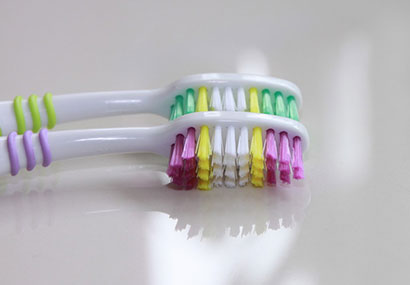TAKING CARE OF YOUR ORAL CAVITY
Healthy oral cavity is a sign of good health and good personality. However, we generally do not take enough care of our oral health and suffer toothless life permanently.
Tooth decay due to germs continues throughout life as long as natural teeth are in the mouth. Just as with children, fluoride is equally important for adult teeth. In addition to drinking fluoridated water, the use of fluoride tooth pastes and mouth rinses can also add to protection.
Gum disease or periodontitis, one of the commonest causes of tooth loss inadvancing years, is usually due to the build-up of plaque. To prevent gum diseaseit is important to remove plaque thoroughly by brushing your teeth each day. Also, by carefully checking your teeth and gums, you may find early signs such as red,swollen or bleeding gums.

An important part of good oral health care is knowing how to brush properly. Careful daily brushing removes plaque which routinely forms on the teeth. Gently brush the teeth on all sides with a soft-bristle brush and fluoride toothpaste. Use circular and short back-and-forth strokes, taking special care to brush carefully along the gum line. Lightly brushing your tongue also helps to remove plaque and food debris and makes your mouth feel fresh.
Dry mouth which makes you feel thirsty or feel the need to sip liquids frequently is common in many adults. It may cause difficulty in eating, swallowing, tasting and speaking. Dry mouth is usually caused by salivary glands failing to function properly. This is a side-effect of many medications and can accompany certain physical problems. Dry mouth can affect oral health by contributing to tooth decay and gum disease. To relieve the dryness, drink extra water and avoid sugary snacks, drinks containing caffeine, tobacco and alcohol which can increase dryness of the mouth. You need to consult your physician to find out the culprit medication.
If you have false teeth (dentures), you should keep them clean and free from food deposits that can cause permanent staining, bad breath, and gum irritation. Once a day, brush all surfaces of the dentures with a denture-care product. Remove your dentures from your mouth and place them in water or a denture-cleansing liquid while you sleep. It is also helpful to rinse your mouth with a warm salt-water solution in the morning, after meals, and at bedtime.
Partial dentures should be cared for in the same way as full dentures. Because bacteria tend to collect under the clasps of partial dentures, it is especially important that this area be cleaned thoroughly.
Dentures need to be replaced or readjusted to the changes in the tissues of the mouth that may have occurred over time. Do not try to repair dentures at home as this can damage the dentures and injure the tissues of the mouth
Dental implants are designed to look like teeth and are surgically inserted through the gum surface to rest on or within the bone of the jaw. Implants are useful only for patients with enough bone structure. As it requires a certain degree of expertise you should contact an experienced dental specialist with whom you can discuss your concerns to be sure that the procedure is right for you.